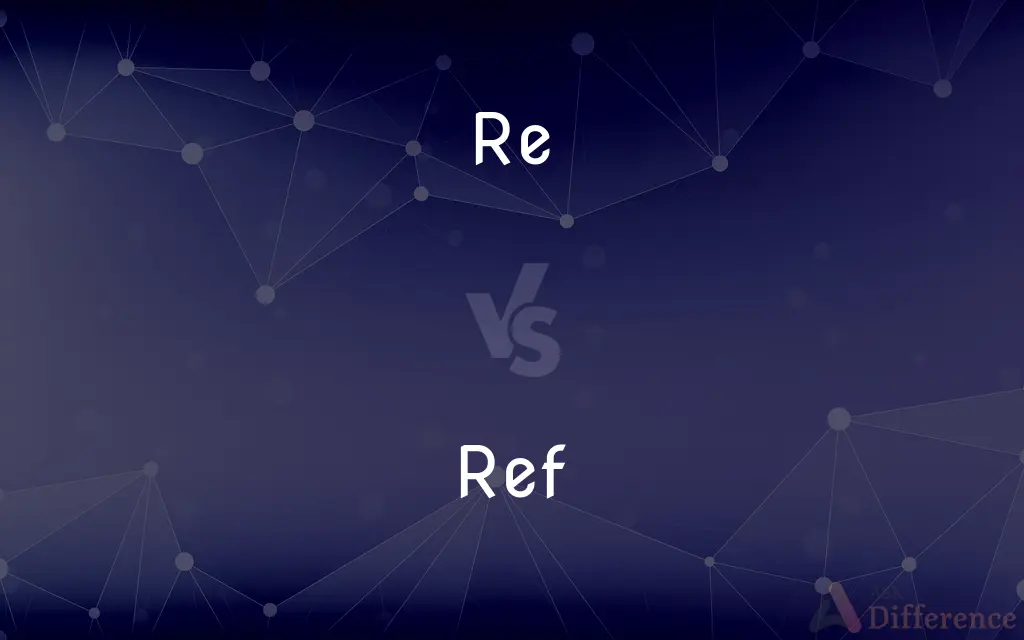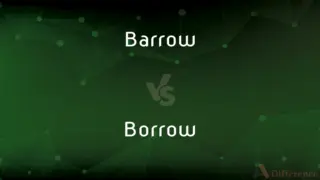Re vs. Ref — What's the Difference?
Edited by Tayyaba Rehman — By Fiza Rafique — Updated on March 17, 2024
"Re" is a prefix used to indicate repetition or back action, while "Ref" does not function as a standalone prefix but often appears as the start of words related to reflection or reference.

Difference Between Re and Ref
Table of Contents
ADVERTISEMENT
Key Differences
The prefix "Re" is widely used in the English language to denote the idea of doing something again or returning to a previous state, as seen in words like "replay" (to play again) and "renew" (to make new again). Ref" is not commonly recognized as an independent prefix but frequently occurs in the initial position of words, such as "reflect" (to throw back light or heat, or to think deeply) and "reference" (to mention or cite).
While "Re" is a productive prefix that actively forms new words or gives existing words new meaning by indicating repetition or reversal, "Ref" typically appears as part of a broader lexeme and does not inherently carry a meaning of action or motion. This difference highlights how "Re" can change the meaning of a base word to express a repeated or reversed action, whereas "Ref" in words suggests a relationship to reflection, referral, or relation without indicating a direct action by itself.
The use of "Re" is systematic in the sense that it can be applied to a wide range of verbs to create new meanings related to repetition or returning to a previous state. On the other hand, the appearance of "Ref" at the beginning of words does not follow a rule for creating new words with a specific, consistent meaning related to the idea of "Ref."
Words beginning with "Re" are commonly found across various contexts and disciplines, illustrating the prefix's versatility in conveying repetition or reversal. In contrast, words starting with "Ref" are often specific to particular contexts, such as "refraction" in physics or "referee" in sports, and do not generally imply a systematic linguistic pattern.
The linguistic role of "Re" as a prefix is well-defined and recognized for its ability to modify the meanings of base words, making it a powerful tool in vocabulary development. Meanwhile, the occurrence of "Ref" in words is more incidental and does not constitute a recognized prefix in English for altering the meanings of base words in a consistent manner.
ADVERTISEMENT
Comparison Chart
Function
Prefix denoting repetition or reversal
Common start of words, not a prefix
Meaning
Doing again, returning to a state
Often related to reflection, reference
Word Formation
Can form new words by prefixing
Does not form new words as a prefix
Examples
Replay, renew, rewrite
Reflect, reference, reform
Contextual Usage
Across various contexts and disciplines
Specific to contexts like physics, sports
Compare with Definitions
Re
Return to a state
Renew your subscription for continued access.
Ref
Cite as evidence
Reference authoritative sources to strengthen your argument.
Re
Reversal of action
Rewind the tape to the beginning.
Ref
Reflect on thoughts
Reflect on your experiences to learn from them.
Re
Reconsideration
Rethink your strategy to improve results.
Ref
Act as an official in sports.
The referee will ensure the game's rules are followed.
Re
Repeat an action
Replay the video to catch the details.
Ref
Bend light or sound
Refraction causes a rainbow to appear when light passes through water droplets.
Re
Restoration
Repair the device to its original condition.
Ref
Relate to something
This study reforms our understanding of historical events.
Re
The second tone of the diatonic scale in solfeggio.
Ref
A referee.
Re
Variant of Ra1.
Ref
(informal) referee
Re
In reference to; in the case of; concerning.
Ref
Abbreviation of reference
Re
About, regarding, with reference to; especially in letters, documents and emails.
Ref
Abbreviation of refectory
Re
(music) a syllable used in solfège to represent the second note of a major scale.
Ref
Refrigerator.
Re
A syllable applied in solmization to the second tone of the diatonic scale of C; in the American system, to the second tone of any diatonic scale.
Ref
To referee; to act as a referee in a sport or game.
Re
A rare heavy polyvalent metallic element that resembles manganese chemically and is used in some alloys; is obtained as a by-product in refining molybdenum
Ref
(sports) the chief official (as in boxing or American football) who is expected to ensure fair play
Re
Ancient hawk-headed Egyptian sun god; a universal creator
Re
The syllable naming the second (supertonic) note of any major scale in solmization
Common Curiosities
Is "Ref" ever used as a standalone prefix?
"Ref" is not commonly recognized as a standalone prefix in English; it usually appears as part of specific words.
Do words with "Ref" always have a common theme?
Many "Ref" words involve concepts of reflection or referencing, but the theme is not universal.
How does "Re" change the meaning of a word?
"Re" indicates repetition or reversal, adding a sense of doing again or going back to a previous state.
Can new words be formed by adding "Re" to existing words?
Yes, adding "Re" to existing words can create new meanings related to doing something again or reversing.
How is "Re" used in a non-verbal context?
"Re" can also prefix nouns and adjectives, like "re-election" or "reusable," indicating repetition or renewal.
Is "Ref" recognized in linguistic studies as a prefix?
"Ref" is not typically studied as a prefix in linguistics; it's more about the occurrence in specific words.
Are words starting with "Ref" related in meaning?
Words starting with "Ref" often relate to reflection, reference, or refraction, but this is not a strict rule.
What is an example of "Re" indicating reversal?
"Revert" is an example where "Re" indicates a return to a previous state or condition.
Can "Re" be used with any verb?
While "Re" can be used with many verbs, not all combinations are grammatically correct or meaningful.
Can "Re" prefix be detached from the base word?
The "Re" prefix is typically attached directly to the base word without a hyphen, except for clarity or pronunciation issues.
Can the use of "Re" or "Ref" change over time?
Yes, language evolves, and the usage and meanings of prefixes and word beginnings can shift over time.
Can "Re" imply continuation rather than repetition?
In some contexts, "Re" can imply a continuation or resumption, as in "resume" or "recontinue."
Are there exceptions to the rules of using "Re"?
English is known for its exceptions, and while "Re" generally denotes repetition or reversal, there may be exceptions or irregularities.
How does context affect the use of "Re" and "Ref" words?
The meaning and use of "Re" and "Ref" words can vary significantly depending on the context in which they are used.
How do "Re" and "Ref" words contribute to language richness?
They expand the vocabulary, allowing for nuanced expression of concepts like repetition, reflection, and reference.
Share Your Discovery

Previous Comparison
Barrow vs. Borrow
Next Comparison
Pail vs. BucketAuthor Spotlight
Written by
Fiza RafiqueFiza Rafique is a skilled content writer at AskDifference.com, where she meticulously refines and enhances written pieces. Drawing from her vast editorial expertise, Fiza ensures clarity, accuracy, and precision in every article. Passionate about language, she continually seeks to elevate the quality of content for readers worldwide.
Edited by
Tayyaba RehmanTayyaba Rehman is a distinguished writer, currently serving as a primary contributor to askdifference.com. As a researcher in semantics and etymology, Tayyaba's passion for the complexity of languages and their distinctions has found a perfect home on the platform. Tayyaba delves into the intricacies of language, distinguishing between commonly confused words and phrases, thereby providing clarity for readers worldwide.













































